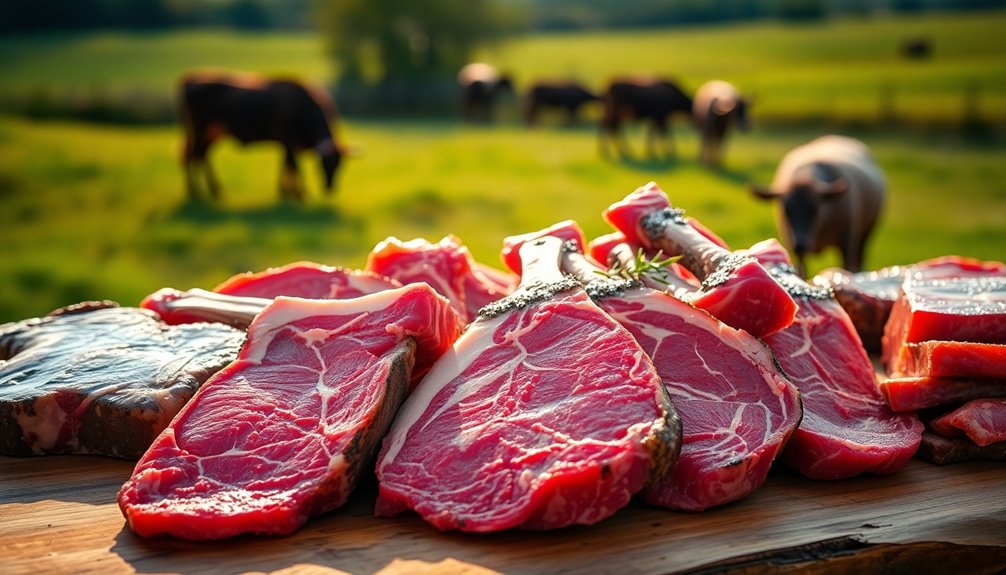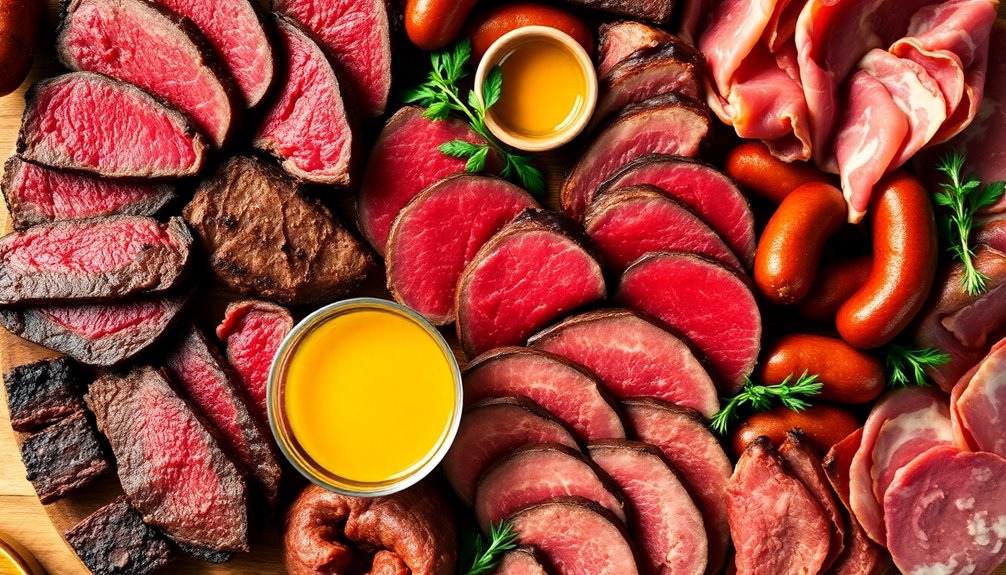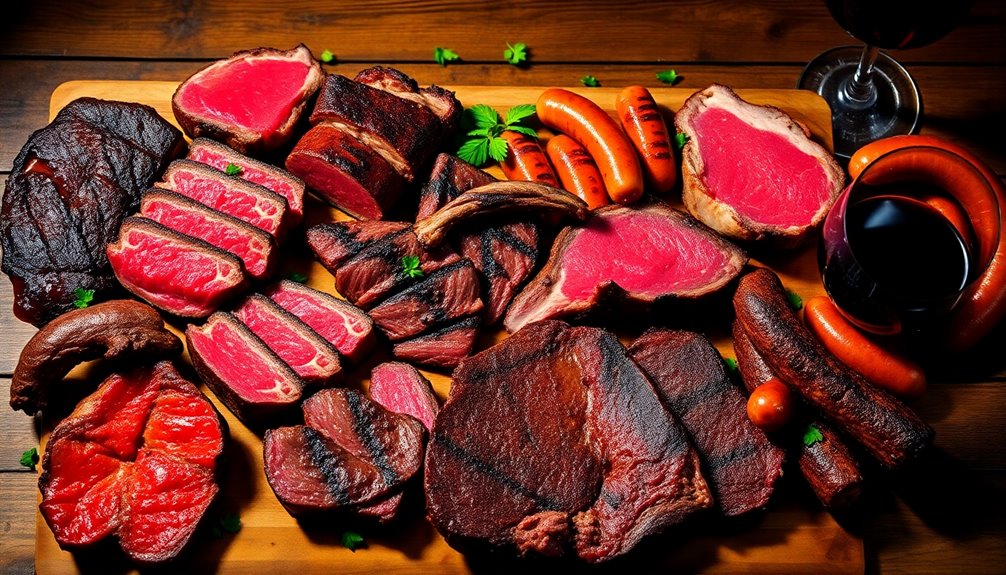The carnivore diet focuses solely on meat and animal products, claiming benefits like weight loss and better health, inspired by traditional diets of cultures such as the Inuit. This all-meat approach emphasizes quality cuts and organ meats for essential nutrients, with hydration sourced from water and bone broth. While some experience weight loss and enhanced energy, concerns arise over nutrient deficiencies, excess protein stress on kidneys, and the diet's sustainability. There's limited scientific research on long-term effects, prompting a need for cautious consideration of potential risks versus benefits. To understand more, you might explore the experiences and insights surrounding this trend.
Key Takeaways
- The carnivore diet emphasizes animal-based foods, drawing on ancestral eating patterns for essential nutrients, particularly quality meats and organ meats.
- Advocates claim benefits like weight loss, improved energy, and mental clarity, though these are often based on anecdotal evidence rather than controlled studies.
- Health risks include potential nutrient deficiencies, kidney stress from excess protein, and concerns about high saturated fat and cholesterol levels.
- Ethical considerations and environmental impacts of meat production raise questions about the sustainability of a strictly carnivorous diet.
- Long-term health effects are still unclear, necessitating careful planning and monitoring to balance benefits and risks.
Origins of the Carnivore Diet

The origins of the carnivore diet trace back to various ancestral eating patterns across the globe, where some cultures thrived primarily on animal-based foods. From an evolutionary perspective, humans have consumed meat since prehistoric times, relying on it for vital nutrients that supported growth and development. In fact, many anthropologists believe that the shift from a primarily plant-based diet to one that included significant meat sources played an important role in our evolution, influencing both our biology and behavior.
Cultural influences also shaped the carnivore diet's emergence, as certain societies, particularly those in harsh environments, depended almost exclusively on animals for sustenance. For instance, the Inuit people in the Arctic regions developed a diet rich in fish, seals, and other animals, which provided the necessary energy to survive in extreme conditions.
Similarly, nomadic tribes in Africa relied heavily on game meat, showcasing how cultural practices and environmental factors dictated dietary choices.
As you explore this dietary approach, it's crucial to recognize the deep roots of meat consumption in various cultures. Understanding these origins can foster a sense of belonging and connection to the past. While modern interpretations may differ, the central tenet remains the same: many people have thrived on animal-based diets throughout history. This perspective not only acknowledges the diverse ways food has shaped human existence but also invites you to consider how these ancestral practices might resonate with your own dietary choices today.
Key Principles of the Diet

Embracing the carnivore diet involves adhering to several key principles that guide your food choices and overall approach to eating. This all-meat regimen focuses primarily on animal-based foods, emphasizing the importance of quality protein sources to meet your nutritional needs. Here are some foundational principles to ponder:
- Choose Quality Cuts: Prioritize grass-fed beef, wild-caught fish, and pasture-raised poultry for top-notch nutrition.
- Include Organ Meats: These nutrient-dense options provide essential vitamins and minerals often missing in muscle meat.
- Stay Hydrated: Drink plenty of water, and contemplate bone broth for added electrolytes and hydration.
- Practice Meal Planning: Organize your meals in advance to make sure you're consistently consuming a variety of protein sources and to avoid temptations.
- Listen to Your Body: Pay attention to hunger cues and adjust portion sizes according to your energy needs.
On the carnivore diet, you'll find that meal planning becomes essential. It helps you stay on track, making certain that you have the right protein sources readily available. By incorporating diverse animal products, you not only enhance your meals but also guarantee a broader spectrum of nutrients.
Ultimately, the key principles of the carnivore diet are about simplifying your eating habits while focusing on high-quality, nutrient-rich foods. This approach can foster a sense of community as you connect with others who share this lifestyle, creating a supportive environment where everyone can thrive together.
Potential Health Benefits

Many enthusiasts of the carnivore diet tout several potential health benefits that come from this all-meat approach. One of the most frequently mentioned advantages is weight loss. Many individuals report significant reductions in body weight when adopting a carnivore diet. This may be due to the elimination of carbohydrates, which often leads to a decrease in overall caloric intake. Additionally, protein-rich foods can promote satiety, helping you feel fuller for longer periods, potentially curbing those pesky cravings that can derail your efforts.
Another potential benefit is improved gut health. While it might seem counterintuitive, some followers claim that a meat-only diet has led to better digestive experiences. By cutting out fiber-rich foods, which can cause bloating and discomfort for some, you may find relief from digestive issues like irritable bowel syndrome (IBS).
The carnivore diet emphasizes easily digestible animal proteins and fats, which may promote a more stable gut environment for certain individuals.
However, it's crucial to approach these claims with caution. While anecdotal evidence is compelling, scientific studies on the long-term effects of the carnivore diet remain limited. It's important to listen to your body and consult with a healthcare professional before making significant dietary changes. As with any diet, individual experiences may vary. Ultimately, if you feel a sense of community and support while exploring these benefits, you're likely to find a more sustainable approach to your health journey.
Nutritional Considerations

When considering the carnivore diet, it's important to evaluate its nutritional aspects carefully. This all-meat approach can lead to significant changes in your body. While many people report increased protein intake, you need to be aware of potential downsides.
Here are some key nutritional considerations:
- Vitamin Deficiencies: Eliminating plant-based foods may result in a lack of essential vitamins, particularly vitamin C and fiber.
- Protein Intake: You'll likely consume more protein than the average diet, which can be beneficial for muscle maintenance, but excess protein may stress your kidneys.
- Digestive Issues: The absence of fiber could lead to constipation and other digestive problems, as your body relies on fiber for regular bowel movements.
- Cholesterol Levels: High intake of saturated fats from animal products can raise cholesterol levels, which some studies link to heart disease.
- Electrolyte Imbalance: Cutting out fruits and vegetables may lead to imbalances in essential minerals like potassium and magnesium.
Understanding these factors can help you make a more informed choice. If you decide to try the carnivore diet, consider supplementing with vitamins or consulting a healthcare professional to mitigate potential deficiencies. Engaging with a community of fellow practitioners may also provide support and shared experiences, helping you navigate the challenges that come with such a strict eating plan. Ultimately, being aware of these nutritional considerations can guide you toward a balanced approach while exploring this unique diet.
Risks and Controversies

While the nutritional considerations of the carnivore diet highlight some potential benefits, they also bring to light various risks and controversies surrounding this all-meat regimen. One significant concern is the lack of diversity in your diet. Without fruits, vegetables, and whole grains, you might miss out on essential nutrients and fiber, which can lead to digestive issues and long-term health problems.
Additionally, ethical concerns arise from the carnivore diet's heavy reliance on animal products. Many people grapple with the moral implications of consuming only meat, particularly regarding animal welfare and environmental sustainability. Scientific evidence suggests that large-scale meat production can contribute to climate change and ecosystem degradation, posing dilemmas for those who value sustainability.
Another controversy centers on the diet's potential health risks. Some studies link high meat consumption to increased risks of heart disease, certain cancers, and kidney issues.
While proponents argue that the diet can promote weight loss and improve metabolic health, critics point out that the long-term effects remain largely unexplored in scientific literature.
Personal Experiences and Testimonials

Personal experiences with the carnivore diet vary widely, reflecting both the enthusiasm of its advocates and the skepticism of its detractors. Many who've embraced this all-meat regimen share compelling success stories, claiming significant health improvements. However, it's pivotal to remember that these experiences are often based on anecdotal evidence, which may not apply universally.
Here are some common themes from those who've tried the carnivore diet:
- Weight Loss: Many report shedding pounds quickly, often attributing this to reduced calorie intake and increased protein consumption.
- Improved Energy Levels: Some individuals experience heightened energy, claiming that eliminating carbohydrates leads to more stable blood sugar levels.
- Mental Clarity: Users often mention enhanced focus and cognitive function, suggesting a potential link between diet and mental performance.
- Skin Health: A number of testimonials highlight clearer skin, with participants noting improvements in conditions like acne or eczema.
- Digestive Changes: Some followers report relief from digestive issues, such as bloating or discomfort, after switching to a meat-only diet.
While these personal accounts can be inspiring, they should be viewed with caution. Anecdotal evidence, while valuable, lacks the scientific rigor of controlled studies. It's paramount to approach the carnivore diet with an open mind but also a critical eye, considering both the positive feedback and the potential risks involved. By doing so, you can make an informed decision that aligns with your health goals.
Expert Opinions and Research

Examining the carnivore diet reveals a mixed bag of expert opinions and research findings, highlighting the need for a nuanced understanding of this all-meat approach. On one hand, some proponents argue that eliminating plant foods can lead to reduced inflammation and improved mental clarity. They cite anecdotal evidence and small studies, suggesting that this diet may help some individuals with autoimmune conditions or digestive issues.
However, many dietitians express caution. They emphasize the importance of variety in your diet, pointing out that plant foods provide essential vitamins, minerals, and fiber that aren't typically found in animal products.
The scientific evidence surrounding the long-term health effects of the carnivore diet is still limited. According to registered dietitians, a lack of diverse food sources may lead to nutrient deficiencies over time, which can affect your overall well-being.
Moreover, the potential risk of increased cholesterol levels and heart disease is a significant concern among health professionals. Most agree that while some people may experience short-term benefits, the long-term sustainability and safety of the carnivore diet are still up for debate.
Frequently Asked Questions
Can Vegetarians Transition to the Carnivore Diet Successfully?
Switching from a vegetarian to a carnivore diet can be challenging but possible. You'll need to be mindful of potential nutrient deficiencies, especially if you've relied on plant-based substitutes for vitamins and minerals. Gradually including animal products while monitoring your body's response can help ease the change.
It's crucial to educate yourself about nutrient requirements to maintain a balanced diet and prevent deficiencies during this important dietary shift.
What Types of Meat Are Best for the Carnivore Diet?
When considering the finest types of meat for your diet, focus on prime proteins and nutrient density. Grass-fed beef, wild-caught fish, and pasture-raised poultry are exceptional choices, as they provide essential nutrients and healthy fats. Organ meats, such as liver, pack a potent nutrient punch too. By prioritizing these top-quality sources, you'll not only meet your protein needs but also support overall health, ensuring you feel your finest on this journey.
How Do I Manage Cravings for Non-Meat Foods?
Craving a slice of pizza while embracing an all-meat lifestyle can be tough. For effective craving management, consider strategies like staying hydrated and incorporating satisfying, fatty cuts of meat to keep you full. When those non-meat alternatives call to you, focus on how they can be replaced with delicious, meat-based recipes. Engaging with a community can also provide support and share tips, making your journey feel less isolating and more enjoyable.
Is the Carnivore Diet Sustainable Long-Term?
Is the carnivore diet sustainable long-term? It can be challenging. While you might enjoy immediate benefits, nutrient deficiencies may arise without diverse food sources. Additionally, some people experience digestive health issues due to the lack of fiber.
Balancing your diet with vegetables or other food groups can help you avoid these problems. It's crucial to listen to your body and consult with a healthcare professional to maintain your overall well-being.
Are There Any Lifestyle Changes Needed While on This Diet?
While on this diet, you might need to adjust your lifestyle, especially in social situations or when eating out. Finding restaurants that cater to your needs can be a challenge. Additionally, you'll want to monitor for potential nutrient deficiencies since a strictly meat-based diet might lack some vitamins and minerals. Consider incorporating supplements to fill any gaps.
Staying informed and prepared can help you navigate these changes while maintaining a fulfilling social life.
Conclusion
As you navigate the carnivore diet, remember it's not just a trend; it's a fork in the road that leads to significant health choices. While many tout its benefits, the potential risks and nutritional gaps warrant careful consideration. Balancing personal experiences with expert insights can help you chart your own course. Ultimately, listening to your body and staying informed will guide you through this meat-centric journey, ensuring it's more than just a passing fad.



